|
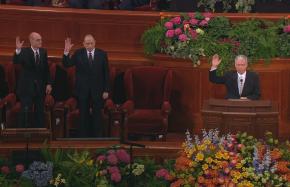 Ever
wonder why both Mormon politicians and lay members vote
in unison in support of the church, despite their differing
political affiliations? Ever
wonder why both Mormon politicians and lay members vote
in unison in support of the church, despite their differing
political affiliations?
Ever
wonder what motivates members of the church to reject their
own spouses, children and relatives in favor of the church?
Ever
wonder why members of the church sacrifice their personal
integrity in defense of official church history and practices?
The
answer is that faithful members know that their first and
foremost duty is uncompromising loyalty to the church.
Church
President Godon B. Hinckley recently declared:
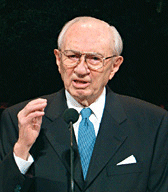 "Now
may I say a word concerning loyalty to the Church. We
see much indifference. There are those who say, 'The Church
won't dictate to me how to think about this, that, or the
other, or how to live my life.'" "Now
may I say a word concerning loyalty to the Church. We
see much indifference. There are those who say, 'The Church
won't dictate to me how to think about this, that, or the
other, or how to live my life.'"
"No,
I reply, the Church will not dictate to any man how he should
think or what he should do. The Church will point out the
way and invite every member to live the gospel and enjoy
the blessings that come of such living. The Church will
not dictate to any man, but it will counsel, it will persuade,
it will urge, and it will expect loyalty from those who
profess membership therein."
"The
book of Revelation declares: 'I know thy works, that thou
art neither cold nor hot: I would thou wert cold or hot.
So then because thou art lukewarm, and neither cold nor
hot, I will spue thee out of my mouth' (Revelation 3:15-16)."
"I
make you a promise, my dear brethren, that while I am serving
in my present responsibility I will never consent to nor
advocate any policy, any program, any doctrine which will
be otherwise than beneficial to the membership of this,
the Lord's Church."
"This
is His work. He established it. He has revealed its doctrine.
He has outlined its practices. He created its government.
It is His work and His kingdom, and He has said, "They
who are not for me are against me" (2 Nephi 10:16)."
"In
1933, there was a movement in the United States to overturn
the law which prohibited commerce in alcoholic beverages.
When it came to a vote, Utah was the deciding state. President
Heber J. Grant, then President of this Church, had pleaded
with our people against voting to nullify Prohibition. It
broke his heart when so many members of the Church in this
state disregarded his counsel."
"On
this occasion I am not going to talk about the good or bad
of Prohibition but rather of uncompromising loyalty to
the Church."
"How
grateful, my brethren, I feel, how profoundly grateful for
the tremendous faith of so many Latter-day Saints who, when
facing a major decision on which the Church has taken a
stand, align themselves with that position. And I am
especially grateful to be able to say that among those who
are loyal are men and women of achievement, of accomplishment,
of education, of influence, of strength-highly intelligent
and capable individuals."
"Each
of us has to face the matter-either the Church is true,
or it is a fraud. There is no middle ground. It is the Church
and kingdom of God, or it is nothing."
- President Gordon B. Hinckley. "Loyalty," April Conference,
2003.
Unquestioning
Obedience a Virtue
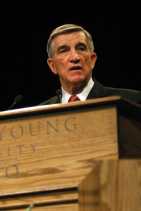 "For
us, to 'believe all things' means to believe the doctrine
of the restored gospel of Jesus Christ as well as the
words of the Latterday prophets. It means to successfully
erase our doubts and reservations. It means that
in making spiritual commitments, we are prepared to hold
nothing back. It means we are ready to consecrate
our lives to the work of the kingdom." "For
us, to 'believe all things' means to believe the doctrine
of the restored gospel of Jesus Christ as well as the
words of the Latterday prophets. It means to successfully
erase our doubts and reservations. It means that
in making spiritual commitments, we are prepared to hold
nothing back. It means we are ready to consecrate
our lives to the work of the kingdom."
"The more
we believe, the easier faith-based obedience becomes. Hence
the value of 'believing all things.'" "We
are instructed to be like children, who are willing
to be taught and then to act without first demanding full
knowledge."
"Some
members are constantly evaluating the gospel by the standards
of the world. They may think, 'That is not how I think the
Lord would want it done,' or, 'Based on my understanding
of the scriptures, the Church position should have been
. . .'"
"Some
Church members may have reservations because of a physical
appetite they are not quite willing to surrender."
"Other
common reservations are flagged by words such as 'yes, but
. . .' when scriptures or prophets are quoted.
Or we may hear, 'I am not going to let the Church make my
decisions for me.'"
"Obedience
is a fundamental law of the gospel. It is not only the
demonstration of our faith but also the foundation of our
faith. But the philosophical standard of the world holds
that unquestioning obedience equals blind obedience, and
blind obedience is mindless obedience. This is simply not
true. Unquestioning obedience to the Lord indicates that
a person has developed faith and trust in Him to the point
where he or she considers all inspired instruction — whether
it be recorded scripture or the words of modern prophets
— to be worthy of obedience."
"One day
there will be answers to all our questions, and they will
be based on divine fairness and love. The Lord will not
hold people accountable for factors over which they have no
control."
"Let us
believe all things. Let us have unquestioning faith in
all of the doctrines and truths of the restored gospel."
"Helps
for Family Home Evening: 1. Blindfold one family member. Have
a parent guide him or her through a set of obstacles. Compare
this activity to the doctrines presented in this article."
- Elder Robert Oaks, "Believe All Things," Ensign,
July 2005, page 30 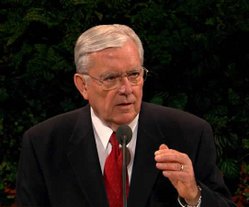 "I
know a 17-year-old who, just prior to the prophet’s
talk, had pierced her ears a second time. She came home
from the fireside, took off the second set of earrings,
and simply said to her parents, “If President
Hinckley says we should only wear one set of earrings, that’s
good enough for me.”" "I
know a 17-year-old who, just prior to the prophet’s
talk, had pierced her ears a second time. She came home
from the fireside, took off the second set of earrings,
and simply said to her parents, “If President
Hinckley says we should only wear one set of earrings, that’s
good enough for me.”"
"Wearing
two pair of earrings may or may not have eternal consequences
for this young woman, but her willingness to obey the prophet
will. And if she will obey him now, on something
relatively simple, how much easier it will be to follow
him when greater issues are at stake."
- Apostle M. Russell Ballard, “His Word Ye Shall
Receive,” Ensign, May 2001, 65
Church
Leaders Expect Conformity
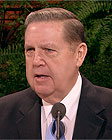 "But
no child in this Church should be left with uncertainty
about his or her parents' devotion to the Lord Jesus Christ,
the Restoration of His Church, and the reality of living
prophets and apostles who, now as in earlier days, lead
that Church according to 'the will of the Lord, . . . the
mind of the Lord, . . . the word of the Lord, . . . and
the power of God unto salvation.' In such basic matters
of faith, prophets do not apologize for requesting unity,
indeed conformity, in the eloquent sense that the
Prophet Joseph Smith used that latter word. In any case,
as Elder Neal Maxwell once said to me in a hallway conversation,
'There didn't seem to be any problem with conformity
the day the Red Sea opened.'" "But
no child in this Church should be left with uncertainty
about his or her parents' devotion to the Lord Jesus Christ,
the Restoration of His Church, and the reality of living
prophets and apostles who, now as in earlier days, lead
that Church according to 'the will of the Lord, . . . the
mind of the Lord, . . . the word of the Lord, . . . and
the power of God unto salvation.' In such basic matters
of faith, prophets do not apologize for requesting unity,
indeed conformity, in the eloquent sense that the
Prophet Joseph Smith used that latter word. In any case,
as Elder Neal Maxwell once said to me in a hallway conversation,
'There didn't seem to be any problem with conformity
the day the Red Sea opened.'"
"What
a classic example of the warning Elder Richard L. Evans
once gave. Said he:
Sometimes
some parents mistakenly feel that they can relax a little
as to conduct and conformity or take perhaps a so called
liberal view of basic and fundamental things-thinking
that a little laxness or indulgence won't matter-or they
may fail to teach or to attend Church, or may voice critical
views. Some parents . . . seem to feel that they can
ease up a little on the fundamentals without affecting
their family or their family's future. But, if a parent
goes a little off course, the children are likely to exceed
the parent's example.
"To
lead a child - or anyone else - even inadvertently, away
from faithfulness, away from loyalty and bedrock belief
simply because we want to be clever or independent is license
no parent nor any other person has ever been given.
In matters of religion a skeptical mind is not a higher
manifestation of virtue than is a believing heart, and analytical
deconstruction in the field of, say, literary fiction can
be just plain old-fashioned destruction when transferred
to families yearning for faith at home. And such a deviation
from the true course can be deceptively slow and subtle
in its impact. As one observer said, "[If you raise the
temperature of my] bath water . . . only 1 degree every
10 minutes, how [will I] know when to scream?"
- Apostle Jeffrey R. Holland, General Conference, Sunday
April 6th 2003
Do
church leaders think they have a duty to tell the truth,
or to protect church authority at all costs?
Apostle Dallin Oaks:
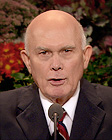 "My
duty as a member of the Council of the Twelve is to protect
what is most unique about the LDS church, namely the
authority of priesthood, testimony regarding the restoration
of the gospel, and the divine mission of the Savior. Everything
may be sacrificed in order to maintain the integrity of
those essential facts. Thus, if Mormon Enigma reveals
information that is detrimental to the reputation of Joseph
Smith, then it is necessary to try to limit its influence
and that of its authors." "My
duty as a member of the Council of the Twelve is to protect
what is most unique about the LDS church, namely the
authority of priesthood, testimony regarding the restoration
of the gospel, and the divine mission of the Savior. Everything
may be sacrificed in order to maintain the integrity of
those essential facts. Thus, if Mormon Enigma reveals
information that is detrimental to the reputation of Joseph
Smith, then it is necessary to try to limit its influence
and that of its authors."
- Apostle Dallin Oaks, footnote 28, Inside the Mind of
Joseph Smith: Psychobiography and the Book of Mormon, Introduction
p. xliii
Apostle Boyd K. Packer:
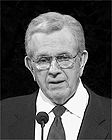 “You
seminary teachers and some of you institute and BYU men
will be teaching the history of the Church this school year.
This is an unparalleled opportunity in the lives of your
students to increase their faith and testimony of the divinity
of this work. Your objective should be that they will
see the hand of the Lord in every hour and every moment
of the Church from its beginning till now.” “You
seminary teachers and some of you institute and BYU men
will be teaching the history of the Church this school year.
This is an unparalleled opportunity in the lives of your
students to increase their faith and testimony of the divinity
of this work. Your objective should be that they will
see the hand of the Lord in every hour and every moment
of the Church from its beginning till now.”
“Church history can be so interesting and so inspiring as
to be a very powerful tool indeed for building faith. If
not properly written or properly taught, it may be a faith
destroyer.”
“There is a temptation for the writer or the teacher of
Church history to want to tell everything, whether it is
worthy or faith promoting or not.”
“Some things that are true are not very useful.”
“That historian or scholar who delights in pointing out
the weaknesses and frailties of present or past leaders
destroys faith. A destroyer of faith — particularly one
within the Church, and more particularly one who is employed
specifically to build faith — places himself in great spiritual
jeopardy. He is serving the wrong master, and unless
he repents, he will not be among the faithful in the eternities.
... Do not spread disease germs!"
- Boyd K. Packer, "The Mantle is Far, Far Greater Than
the Intellect", 1981, BYU Studies, Vol. 21, No. 3, pp. 259-271
Apostle Russell M. Nelson:
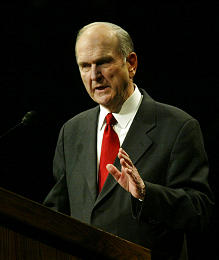 "Indeed,
in some instances, the merciful companion to truth is
silence. Some truths are best left unsaid." "Indeed,
in some instances, the merciful companion to truth is
silence. Some truths are best left unsaid."
"Any who are tempted to rake through the annals of history,
to use truth unrighteously, or to dig up “facts” with the
intent to defame or destroy, should hearken to this warning
of scripture:
“The
righteousness of God [is] revealed from faith to faith:
as it is written, The just shall live by faith. For the
wrath of God is revealed from heaven against all ungodliness
and unrighteousness of men, who hold the truth in unrighteousness.”
(Rom. 1:17-18.)
"I
repeat: 'The wrath of God is … against all … who hold the
truth in unrighteousness.'"
To anyone who, because of truth, may be tempted to become
a dissenter against the Lord and his anointed, weigh carefully
your action in light of this sacred scripture:
“These
dissenters, having the same instruction and the same information
… yea, having been instructed in the same knowledge of
the Lord, nevertheless, it is strange to relate, not long
after their dissensions they became more hardened and
impenitent, and … wicked, … entirely forgetting
the Lord their God.” (Alma 47:36.)
"We
must realize that we are at war. The war began before the
world was and will continue. The forces of the adversary
are extant upon the earth. All of our virtuous motives,
if transmitted only by inertia and timidity, are no match
for the resolute wickedness of those who oppose us."
- Russell M. Nelson, “Truth—and More,” Ensign, Jan. 1986,
page 69
Never Criticize Past or Present Church Leaders - Even
if it's True
 "It
is one thing to depreciate a person who exercises corporate
power or even government power. It is quite another thing
to criticize or depreciate a person for the performance
of an office to which he or she has been called of God.
It does not matter that the criticism is true." "It
is one thing to depreciate a person who exercises corporate
power or even government power. It is quite another thing
to criticize or depreciate a person for the performance
of an office to which he or she has been called of God.
It does not matter that the criticism is true."
"
As Elder George F. Richards, President of the Council of
the Twelve, said in a conference address in April 1947,
'when we say anything bad about the leaders of the Church,
whether true or false, we tend to impair their influence
and their usefulness and are thus working against the Lord
and his cause.' ... The Holy Ghost will not guide
or confirm criticism of the Lord's anointed, or of Church
leaders, local or general. This reality should be part of
the spiritual evaluation that LDS readers and viewers apply
to those things written about our history and those who
made it."
- Dallin H. Oaks, "Reading Church History," CES Doctrine
and Covenants Symposium, Brigham Young University, 16 Aug.
1985, page 25. also see Dallin H. Oaks, "Elder Decries Criticism
of LDS Leaders," quoted in The Salt Lake Tribune, Sunday
August 18, 1985, p. 2B
Apostle Dallin H. Oaks published a similar talk for the
February 1987 Ensign Magazine. Again, Apostle Oaks declared
that there is no place in the church for public criticism
of church leaders, even if the criticism is true. He also
said:
 "Truth
surely exists as an absolute, but our use of truth should
be disciplined by other values. ... When truth is constrained
by other virtues, the outcome is not falsehood but silence
for a season. As the scriptures say, there is “a time
to keep silence, and a time to speak.” "Truth
surely exists as an absolute, but our use of truth should
be disciplined by other values. ... When truth is constrained
by other virtues, the outcome is not falsehood but silence
for a season. As the scriptures say, there is “a time
to keep silence, and a time to speak.”
"Does the commandment to avoid faultfinding and evil speaking
apply to Church members’ destructive personal criticism
of Church leaders? Of course it does. It applies to criticism
of all Church leaders—local or general, male or female.
In our relations with all of our Church leaders, we should
follow the Apostle Paul’s direction: “Rebuke not an elder,
but intreat him as a father.” (1 Tim. 5:1.)"
"Government or corporate officials, who are elected directly
or indirectly or appointed by majority vote, must expect
that their performance will be subject to critical and public
evaluations by their constituents. That is part of the process
of informing those who have the right and power of selection
or removal. The same is true of popularly elected officers
in professional, community, and other private organizations."
"A different principle applies in our Church, where the
selection of leaders is based on revelation, subject
to the sustaining vote of the membership. In our system
of Church government, evil speaking and criticism of leaders
by members is always negative. Whether the criticism is
true or not, as Elder George F. Richards explained,
it tends to impair the leaders’ influence and usefulness,
thus working against the Lord and his cause."
"Public debate—the means of resolving differences in a democratic
government—is not appropriate in our Church government.
We are all subject to the authority of the called and
sustained servants of the Lord. They and we are all governed
by the direction of the Spirit of the Lord, and that Spirit
only functions in an atmosphere of unity. That is why
personal differences about Church doctrine or procedure
need to be worked out privately."
- Apostle Dallin H. Oaks, “Criticism,” Ensign, Feb. 1987,
page 68
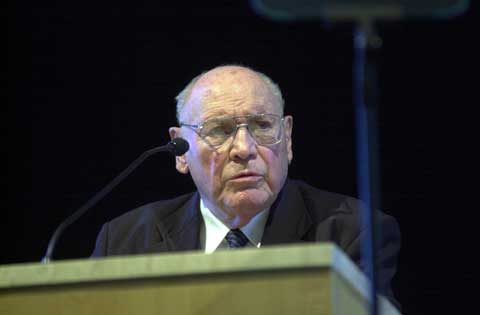 "Some
people exalt themselves above God and His annointed servants
because of their learning and scholarly achievements. We
must never allow our intellect to take priority over our
spirit. Our intellect can feed our spirit and our
spirit can feed our intellect, but if we allow our intellect
to take precedence over our spirit, we stumble, find fault,
and may even lose our testimonies." "Some
people exalt themselves above God and His annointed servants
because of their learning and scholarly achievements. We
must never allow our intellect to take priority over our
spirit. Our intellect can feed our spirit and our
spirit can feed our intellect, but if we allow our intellect
to take precedence over our spirit, we stumble, find fault,
and may even lose our testimonies."
- Apostle Joseph B. Wirthlin. October 2004 General Conference.
 “You
may not like what comes from the authority of the Church.
It may contradict your political views. It may contradict
your social views. It may interfere with some of your social
life. But if you listen to these things, as if from the
mouth of the Lord himself, with patience and faith,
the promise is that ‘the gates of hell shall not prevail
against you; yea, and the Lord God will disperse the powers
of darkness from before you, and cause the heavens to shake
for your good, and his name’s glory.’ (DC 21:6)” “You
may not like what comes from the authority of the Church.
It may contradict your political views. It may contradict
your social views. It may interfere with some of your social
life. But if you listen to these things, as if from the
mouth of the Lord himself, with patience and faith,
the promise is that ‘the gates of hell shall not prevail
against you; yea, and the Lord God will disperse the powers
of darkness from before you, and cause the heavens to shake
for your good, and his name’s glory.’ (DC 21:6)”
- Prophet Harold B. Lee, Conference Report, Oct. 1970,
p. 152
One
effective way church members are locked into loyalty is
through the temple ordinances, which include strong oaths
of total loyalty and sacrifice to the church.
Quoting
from the temple ceremony:
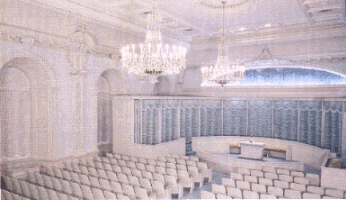 TEMPLE
NARRATOR: (All patrons stand.) "And as Jesus Christ
has laid down his life for the redemption of mankind, so
we should covenant to sacrifice all that we possess,
even our own lives if necessary, in sustaining and defending
the Kingdom of God." TEMPLE
NARRATOR: (All patrons stand.) "And as Jesus Christ
has laid down his life for the redemption of mankind, so
we should covenant to sacrifice all that we possess,
even our own lives if necessary, in sustaining and defending
the Kingdom of God."
"All
arise. Each of you bring your right arm to the square. You
and each of you solemnly covenant and promise before God,
angels, and these witnesses at this alter that you will
observe and keep the Law of Sacrifice, as contained
in the Old and New Testament, as it has been explained to
you. Each of you bow your head and say "yes.""
TEMPLE
PATRONS: "Yes."
ELOHIM:
"That will do." (All patrons sit down.)
TEMPLE
NARRATOR: (All patrons stand.) "Each of you bring your
right arm to the square. You and each of you covenant
and promise before God, angels, and these witnesses at this
altar, that you do accept the Law of Consecration
as contained in this, (The Officiator holds up a copy of
the Doctrine and Covenants again.), the Book of Doctrine
and Covenants, in that you do consecrate yourselves,
your time, talents, and everything with which the Lord has
blessed you, or with which he may bless you, to the Church
of Jesus Christ of Latter-day Saints, for the building up
of the Kingdom of God on the earth and for the establishment
of Zion."
"Each
of you bow your head and say "yes.""
TEMPLE
PATRONS: "Yes."
PETER:
"That will do." (All patrons sit down.)
Mormons
take these oaths very seriously. In fact, all members of
the church who attened the temple prior to 1990 also made
death-oaths in connection with these pledges of absolute
loyalty.
From
the temple ceremony before 1990 through the 1930's:
Death
Oath #1:
ELOHIM:
"All arise." (All patrons stand.)
ELOHIM:
"Each of you make the sign of the First Token of the
Aaronic Priesthood, by bringing your right arm to the square,
the palm of the hand to the front, the fingers together,
and the thumb extended. This is the sign. Now, repeat
in your mind after me the words of the covenant, at the
same time representing the execution of the penalty."
"I
________, think of the new name, covenant before God, angels
and these witnesses that I will never reveal the First Token
of the Aaronic Priesthood, with its accompanying name and
sign, and penalty. Rather than do so, I would suffer my
life to be taken."
(Patrons
perform the action as the Officiator guides them.)
"That
will do." (Patrons sit down.)
Death
Oath #2:
PETER:
"The sign is made by bringing the right hand in front
of you, with the hand in cupping shape, the right arm forming
a square, and the left arm being raised to the square. This
is the sign. (The officiator demonstrates.) The
Execution of the Penalty is represented by placing the right
hand on the left breast, drawing the hand quickly across
the body, and dropping the hands to the sides. I will now
explain the covenant and obligation of secrecy which are
associated with this token, its name, and sign, and penalty,
and which you will be required to take upon yourselves."
PETER:
"All arise. (All Patrons stand.) Each of you make the
sign of the Second Token of the Aaronic priesthood by bringing
the right hand in front of you, with the hand in cupping
shape, the right arm forming a square, and the left arm
being raised to the square. This is the sign."
"Now,
repeat in your mind after me the words of the covenant,
at the same time representing the Executing of the Penalty."
"I,
_________, think of the first given name, solemnly covenant,
before God, angels, and these witnesses that I will never
reveal the second Token of the Aaronic Priesthood, with
its accompanying name, and sign, and penalty. Rather than
do so, I would suffer my life to be taken."
(Patrons
perform the action as the Officiator guides them.)
"That
will do." (All patrons sit down.)
Death
Oath #3:
PETER:
"All arise. (All patrons stand.) Each of you make the
sign of the First Token of the Melchizedek Priesthood or
Sign of the Nail by brining the left hand in front of you
with the hand in cupping shape, the left arm forming a square;
also by bringing the right hand is also brought forward,
the palm down, the fingers close together, the thumb extended,
and by placing the thumb over the left hip. This is the
sign."
"Now
repeat in your mind after me the words of the covenant,
at the same time representing the Execution of the
Penalty:"
"I
solemnly covenant in the name of the Son that I will never
reveal the First Token of the Melchizedek Priesthood or
Sign of the Nail, with its accompanying name,and sign and
penalty. Rather than do so, I would suffer my life to be
taken."
(Patrons
perform the action as the Officiator guides them.)
"That
will do." (All patrons sit down.)
Prior
to the 1930's, these death oaths were even more grewsome.
From the temple ceremony prior to the 1930's:
ADAM
: "We, and each of us, covenant and promise that we
will not reveal any of the secrets of this, the first token
of the Aaronic priesthood, with its accompanying name, sign
or penalty. Should we do so, we agree that our throats
be cut from ear to ear and our tongues torn out by their
roots."
ADAM:
"All bow your heads and say Yes."
TEMPLE
PATRONS: "Yes." (All patrons sit down.)
PETER:
"The brethren and sisters will now stand, push back
the seats, place the robe on the left shoulder, and receive
the Second Token of the Aaronic Priesthood. We and each
of us do covenant and promise that we will not reveal the
secrets of this, the Second Token of the Aaronic Priesthood,
with its accompanying name, sign, grip or penalty. Should
we do so, we agree to have our breasts cut open and our
hearts and vitals torn from our bodies and given to the
birds of the air and the beasts of the field."
"All
bow your heads and say yes."
TEMPLE
PATRONS: "Yes." (All patrons sit down.)
PETER:
"We and each of us do covenant and promise that we
will not reveal any of the secrets of this, the First Token
of the Melchizedek Priesthood, with its accompanying name,
sign or penalty. Should we do so, we agree that
our bodies be cut asunder in the midst and all our bowels
gush out."
"All
bow your heads and say yes."
TEMPLE
PATRONS: "Yes." (All patrons sit down.)
Is it
any wonder that faithful Mormons will give up everything,
including their own family members and integrity to the
cause of the church?
How
could anyone who takes these oaths seriously be open-minded
about problems with the church? |